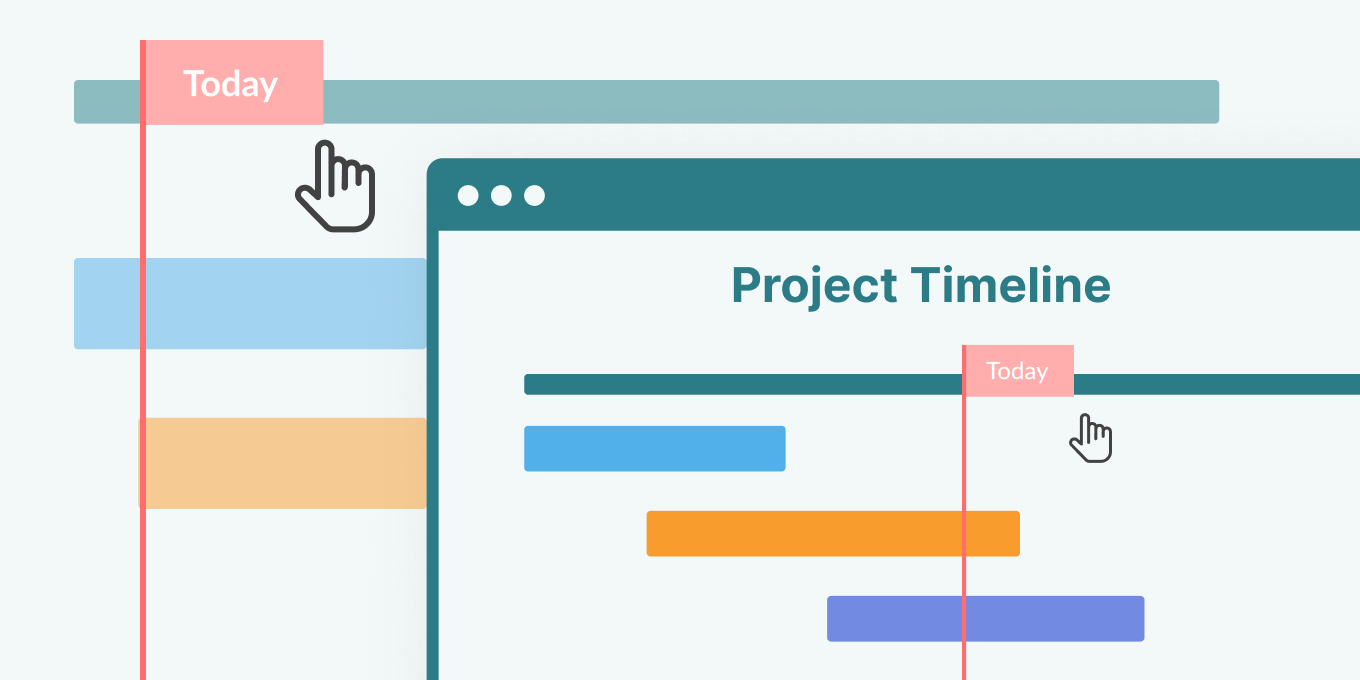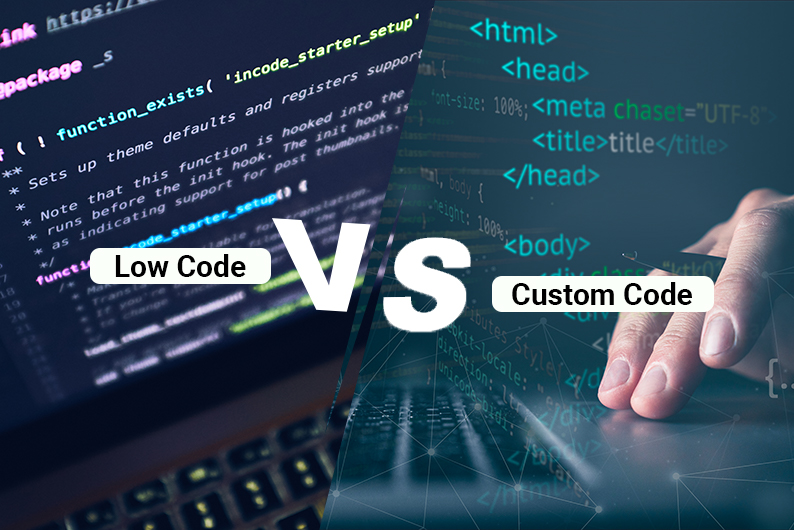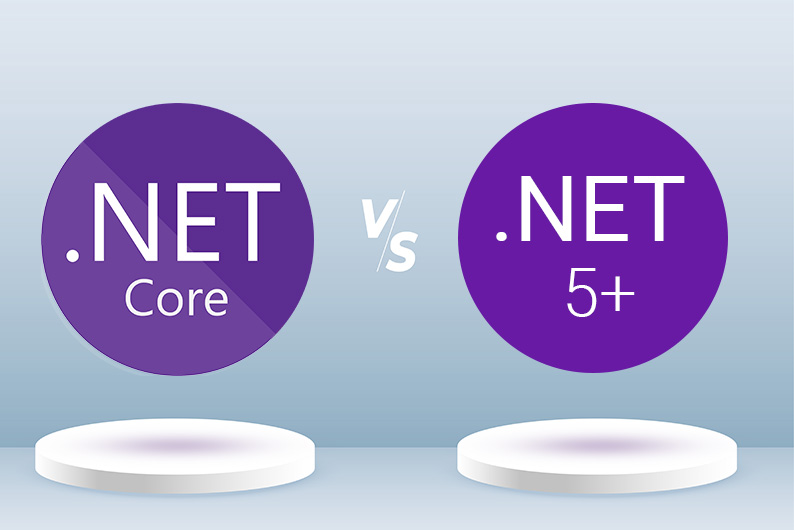We are halfway through 2023 and technological advancements are hitting almost every industry at lightning speed. In the digital age, businesses operating at all scales require robust software solutions to survive in the market. A holistic software solution helps you automate your processes, simplify your tasks, and build healthy relationships with your customers.
However, the approach you choose for building your business software has the power to decide your venture’s fate. Until recently, businesses had two major choices when it came to implementing a software solution – building custom software and purchasing off-the-shelf software. Over time, the route of building low code software has found its way into the equation.
In this blog, we will understand low code vs custom software development solutions to help you make the right choice in enhancing your business’s IT infrastructure.
What Is Low Code Software Development?
Low code software development is a fairly new methodology used for developing software applications across the board. As the name suggests, it involves building applications without writing long and tedious lines of code.

Also known as rapid application development, low code development relieves developers from spending more time and effort in building software solutions for their clients. While this sounds lucrative and a welcome change in the world of software development, it rarely delivers what it promises.
Before getting to the nitty-gritty details about the features of low code software development, let us understand the approach better. Here are a few reasons why this methodology is rapidly gaining popularity amongst new developers:
- Low code development gives developers drag-and-drop facilities
- It involves working with wizard-based workflows
- It facilitates model-driven software development
- It speeds up the software development and deployment process
- It does not require in-depth technical expertise
- It increases your time-to-market
What Is Custom Software Development?
Custom software development is the process of developing software solutions tailored to the specific needs of an organization. Custom software development companies hire experienced developers with immense technical expertise to build custom-made software solutions.

Here are some of the most important reasons why organizations choose to build custom software applications:
- Custom software development resolves unique business issues
- It helps you create a unique brand image
- It lets you build secure applications
- It involves high flexibility and scalability
- It is a cost-effective way of building customized software
Low Code Vs Custom Software Development Solutions: A Detailed Comparison
Now that we know what each of the two approaches to software development stands for, let us have a closer look at low code vs custom software development solutions:
The Process
When it comes to the process of building a software application, low code development takes the easy way out. It allows developers to create their own modules using drag-and-drop functionalities. Here, developers focus more on the modules chosen than what the end-users need.
On the other hand, custom software development focuses on the needs, preferences, and issues of the end users. All of its requirements are charted out based on your objectives and the end-users’ convenience. The focus here is also more on the business workflows to be streamlined to obtain the desired results.
Flexibility
The definition of low code development may confuse readers into believing that it offers more flexibility than custom software development solutions. However, that is not the case. While low code applications can be built faster, they are not flexible enough to cover all business workflows you wish to streamline. Businesses often end up compromising on the results while building such applications just because they can be built faster.
Custom software development is much more flexible and gives complete authority to the developers to tailor your software according to your needs. It has the capability to cover all your business workflows without making any compromises.
Timeline Management

As low code development prevents users from writing long lines of code, it gives you your software product at a faster rate than custom software development. However, this does not make it a more favorable option when it comes to timeline management.
While low code development ensures faster development, the development isn’t always according to all requirements of the client. If the client is not willing to make any compromises, the developers will be required to take the longer route, stretching the overall project timeline. Moreover, it is important to note that software integrations are not covered in the modular coding processes of low code development. If you want to integrate your software with one or more suitable third parties, it will increase your overall software development time.
Over time, custom software development has become much faster. Service providers have now started working with technologies and methodologies like Agile and DevOps to make custom software development faster. Moreover, if you schedule your project well, you can get your custom software built in time. These plans often include third-party integrations as well, making the entire development process simpler, faster, and more organized.
Budgeting
If you want to build a simple business application that won’t require changes once it is developed, low code software development will be a cheaper alternative for you. However, it will turn out to be a fairly expensive option if you wish to make changes to your application once it is built.
Custom software development is generally more expensive as it involves expert technical professionals writing complicated lines of code. However, it gives you the flexibility and freedom to make as many changes as you want before launching your software. Building a custom software solution also eliminates the need to purchase add-ons as you can ask your developers to add all necessary tools while building your software.
Support And Maintenance
In the case of building a low code application, businesses may not obtain holistic support and maintenance services. This is because most components used in building such applications are pre-built. Wherever there is less code and more pre-built components, you cannot expect personalized support and maintenance.
On the other hand, custom software development gives you an opportunity to seek holistic support and maintenance services from your developers. As these services are bespoke and involve more coding, you can ask for upgrades and revisions from your team members at any time. There are many custom software development companies like Intellisource that provide standalone support and maintenance services as well.
Legacy Integration And Migration
Migrating and integrating third-party systems becomes a little more difficult with low code development as it requires you to work with pre-built components. This often adds to the challenges of developers in terms of time and cost to be allocated to the project.
On the other hand, custom software development ensures more effective legacy integration and migration. Here, almost every project that requires specific components to be migrated or integrated states the same in the plan, helping developers implement the same while building the software.
Security
Low code development involves working on several components that are already coded. It is almost impossible to know the intricacies of these codes, leading to reduced control over your application’s security. Moreover, constantly varying stakeholders may put your software’s security at stake.
When you build a custom software solution, you have complete control over the security protocols to be set for your project. Here, you know all nuances of your application and can make it as secure as you wish. From granting permissions to assigning user roles, custom software development puts you in the driver’s seat, allowing the end-users to install a secure application.
Technical Expertise

Most low-code software development platforms and initiatives allow non-technical users to build software applications. This approach does not require developers to have professional training, experience, and qualifications. If anyone learns the basics of developing a low code software solution, they can do so with a little help.
On the other hand, custom software development requires trained and experienced developers to work on projects. As this approach requires dedicated coding and programming, businesses seek IT professionals skilled in specific technologies and frameworks to build custom software applications.
Low Code Vs Custom Software Development Solutions: Which One Should You Choose?
Both low code and custom software development have their own benefits and drawbacks. The approach you choose depends on the kind of software you want to build and the project you will be working on. Make sure you seek help from trained professionals before you make any decision.
To make your decision easier, here are a few instances where low-code development is more suitable:
- Difficulty in finding trained software developers
- Building simple software applications
- The need for minor modifications in an already-developed software solution
- Working on a limited budget
On the other hand, here are a few instances that should prompt you to work with custom software development companies:
- Building complex software
- Having access to trained and experienced developers
- Working with multiple customization requirements
- The need for high security
- Building a scalable and flexible software solution
- The need for personalized support and maintenance
- Integrating your software with a suitable third-party application or service


 Previous blog
Previous blog



